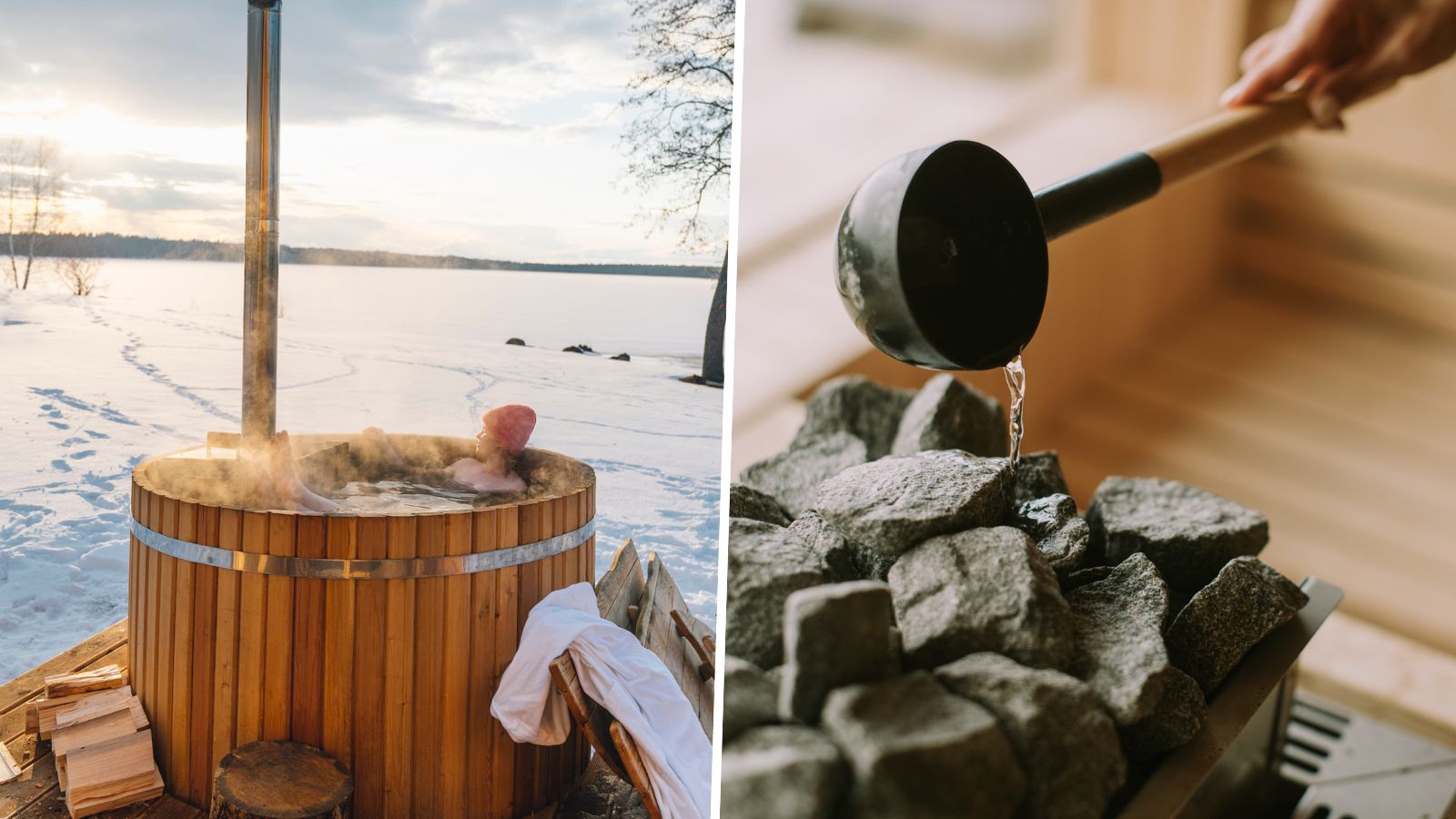Hot tub vs sauna – which is the best choice for your backyard?
If you can’t choose between a hot tub or a sauna, these pros and cons will help you make a decision


Design expertise in your inbox – from inspiring decorating ideas and beautiful celebrity homes to practical gardening advice and shopping round-ups.
You are now subscribed
Your newsletter sign-up was successful
Want to add more newsletters?

Twice a week
Homes&Gardens
The ultimate interior design resource from the world's leading experts - discover inspiring decorating ideas, color scheming know-how, garden inspiration and shopping expertise.

Once a week
In The Loop from Next In Design
Members of the Next in Design Circle will receive In the Loop, our weekly email filled with trade news, names to know and spotlight moments. Together we’re building a brighter design future.

Twice a week
Cucina
Whether you’re passionate about hosting exquisite dinners, experimenting with culinary trends, or perfecting your kitchen's design with timeless elegance and innovative functionality, this newsletter is here to inspire
Either a hot tub or a sauna is a luxurious feature to have at home. Being able to simply step out into the backyard rather than having to visit a spa to enjoy the relaxation one of these can offer is tempting, but weighing up which is the best option for your space can be difficult.
The best hot tub is great for unwinding, socializing, and for using after exercise. But opt for a home sauna and it can provide stress relief, aid recovery after exercise, and create health benefits.
When you’re choosing between the two, you’ll also need to consider how much work installation in the yard requires as well as maintenance requirements, and we’ve put together the pros and cons to help you make the right choice.
How to choose between hot tub vs sauna
There’s no doubt that if you follow the rules for buying a hot tub, you can make the very most of your spend and enjoy warm water bathing for years to come. But a sauna can be great for health and wellbeing, too.
The way to decide between the two? Check out these pros and cons to find out which will better suit your needs.
Pros of hot tubs
Installation
Hot tub installation is typically simple if you opt for an inflatable model or an above-ground version. A level surface is a must and it must be able to bear the weight of both tub and water. Access to electricity will also typically be required. In-ground designs are more complicated to install, of course.
Design expertise in your inbox – from inspiring decorating ideas and beautiful celebrity homes to practical gardening advice and shopping round-ups.
Relaxation
‘A hot tub provides a perfect haven for relaxation,’ says Ben Cook, marketing director at Wave. ‘The warm water, soothing jets, and gentle massage can help alleviate tension in muscles, promote circulation, and induce a sense of calm and relaxation. It offers a serene escape where you can unwind and rejuvenate after a long day or week.’
Alleviation of muscle pain
Hot tub health benefits include the fact they can ease muscle pain – and they do so in a few different ways, says Dr Mahmud Kara. ‘The first is through the direct application of heat on the body which can help specifically target sore areas and provide relief,’ he says.
‘Furthermore, some studies have found that direct heat application can help improve blood flow as well as nutrient and oxygen delivery to the muscles which in turn can help reduce pain, stiffness, or soreness.
‘Some studies have also suggested that immersion in warm to hot water can help reduce lactic acid buildup which is important because excessive lactic acid can be one of the causes of muscle soreness or stiffness especially following physical activity.’
Stress relief
Need to de-stress? ‘While there have not been studies on hot tubs specifically for stress,’ notes Dr Kara, ‘there is research that suggests that immersion in warm water can help relax and balance the sympathetic nervous system.
‘The sympathetic nervous system plays a central role in the “fight or flight” (or stress) response that occurs in the body; therefore, directly targeting this part of the nervous system through water immersion may help to alleviate stress.’
Socializing and quality time
Like a pool, a hot tub’s great for sharing. ‘A hot tub creates an inviting space for socializing and spending quality time with family and friends,’ says Ben Cook. ‘It becomes a focal point for gathering, conversation, and shared experiences. Whether it’s hosting intimate gatherings or enjoying moments with loved ones, a hot tub enhances social connections and creates lasting memories.’
Compact dimensions
What’s more, a hot tub fits in easily. ‘A backyard hot tub is a great alternative for an outdoor space that may be too small to add a swimming pool,’ says Hubert Miles, certified pool and spa inspector through NACHI. It can look good, too, with hot tub deck ideas that create stylish surroundings.
Cons of hot tubs
Maintenance needs
A hot tub brings with it some chores that, while not difficult, do need commitment. ‘Hot tubs require regular maintenance, including water testing, chemical balancing, filter cleaning, and upkeep,’ says Hubert Miles. ‘Failing to maintain the hot tub properly can lead to water quality issues and affect its longevity.’
Energy requirements
The effect on energy bills might be noticeable. ‘Hot tubs typically consume a lot of energy, especially if they are not energy efficient models,’ says Hubert. ‘This can result in higher utility bills, so it's important to consider the long term cost of operation.’
Cost
As a rule, a hot tub is an investment buy. ‘Hot tubs have a high upfront cost,’ says Hubert Miles. ‘Basic models start around $3,000, mid-priced options cost approximately $8,000, and luxury models begin at $16,000. Installation costs can range from $150 to $500 for an electrician to run a dedicated circuit.’
Health issues
A hot tub may not be the right backyard feature for everyone. ‘In general, it is always best to consult your medical professional before using hot tubs to ensure that it is right for your specific health goals and needs,’ says Dr Kara. ‘Those with heart disease, pregnancy, history of seizures, and the use of certain medications may be wary of using a hot tub.’
Pros of saunas
Cost
A sauna could prove cheaper to install than a hot tub. According to Fixr, a sauna for four professionally installed will cost around $3,900 to $6,200 compared to its estimate of $4,000 to $8,500 for a professionally installed four-person hot tub.
Maintenance
A sauna won’t leave you with any maintenance tasks other than regular cleaning, so if you don’t have enough time for extra chores, such as testing the water, shocking a hot tub, plus hot tub hygiene, a sauna is a superior choice.
Stress relief
While the warm water of a hot tub could help you de-stress, it’s a notable advantage of saunas. ‘One of the greatest benefits of saunas is relaxation, or stress reduction,’ says Dr Kara. ‘Not only is the atmosphere itself relaxing but the heat can help ease muscle tension, relax the sympathetic nervous system, and stimulate the release of important endorphins for mental wellbeing.’
Exercise recovery and cardiovascular health
Saunas can have additional health benefits. ‘Saunas can help relax the blood vessels and dilate them which is important for increasing blood flow and can help with recovery after exercise as well as cardiovascular health,’ says Dr Kara.
‘Because saunas can help with blood vessel dilation and improved blood flow some research has suggested that they may help decrease the risk of cardiovascular disease and other heart-related illnesses.’
Cons of saunas
Installation
Installing an outdoor sauna in your yard is more complicated than putting in a hot tub as it needs a suitable foundation and enclosure, though some come complete with all the fittings and just need suitable electrics installed to connect to. An electrician and possibly a plumber depending how it’s heated are required.
Situation
Jump into a hot tub and you can enjoy looking at your yard, and maybe views beyond it, and reap the benefits of being outside. In the sauna, on the other hand, you’ll be inside even though you’re in the yard and the view’s simply the inside of the sauna.
Less attractive to friends and family
Invite folks to share your hot tub and they’ll often jump at the chance. A sauna, though, feels rather less like the venue for a social event (although it can be great to share with exercise buddies after working out).
Health issues
Saunas aren’t the right thing for everyone. ‘Just like with hot tubs, in general, it is always best to consult your medical professional before using a sauna to ensure that it is right for your specific health goals and needs,’ says Dr Kara. ‘Those with heart disease, pregnancy, skin conditions, or the use of certain medications may be wary of using saunas.’
The verdict
Hot tubs and saunas both offer a huge number of benefits to many people, and either could be worth adding to your yard. Since both are significant investments, it’s likely to be how much use you’ll get out of it, and how important it is that you can share your luxury feature with others that will prove the deciding factors.
If you’re focused on the future, the jury is out on whether hot tubs are water features that could devalue your home while a sauna might be a winner for a luxury house, but since they aren’t such a common amenity might be less appealing to homebuyers typically.

Sarah is a freelance journalist and editor. Previously executive editor of Ideal Home, she’s specialized in interiors, property and gardens for over 20 years, and covers interior design, house design, gardens, and cleaning and organizing a home for Homes & Gardens. She’s written for websites, including Houzz, Channel 4’s flagship website, 4Homes, and Future’s T3; national newspapers, including The Guardian; and magazines including Future’s Country Homes & Interiors, Homebuilding & Renovating, Period Living, and Style at Home, as well as House Beautiful, Good Homes, Grand Designs, Homes & Antiques, LandLove and The English Home among others. It’s no big surprise that she likes to put what she writes about into practice, and is a serial house renovator.